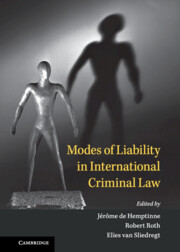Book contents
- Modes of Liability in International Criminal Law
- Modes of Liability in International Criminal Law
- Copyright page
- Contents
- Biographies
- Acknowledgements
- Abbreviations
- 1 Cross-Cutting Issues
- Part I Individual Commission
- Part II Joint Commission
- 5 Co-Perpetration Based on Joint Control over the Crime
- 6 Joint Criminal Enterprise
- Part III Participation
- Part IV Participating in Group Activities
- Part V Inchoate and Preparatory Acts
- Part VI Other Forms of Responsibility
- Part VII Concluding Observations
- Index
- References
5 - Co-Perpetration Based on Joint Control over the Crime
from Part II - Joint Commission
Published online by Cambridge University Press: 01 July 2019
- Modes of Liability in International Criminal Law
- Modes of Liability in International Criminal Law
- Copyright page
- Contents
- Biographies
- Acknowledgements
- Abbreviations
- 1 Cross-Cutting Issues
- Part I Individual Commission
- Part II Joint Commission
- 5 Co-Perpetration Based on Joint Control over the Crime
- 6 Joint Criminal Enterprise
- Part III Participation
- Part IV Participating in Group Activities
- Part V Inchoate and Preparatory Acts
- Part VI Other Forms of Responsibility
- Part VII Concluding Observations
- Index
- References
Summary
This chapter examines the concept of co-perpetration, as defined and developed in the jurisprudence of the ICC. To this end, the research contained herein is divided into two separate, yet interrelated, parts that focus on the two distinct forms of co-perpetration, which the Court has recognized in its case law: ‘direct’ and ‘indirect’ co-perpetration.
- Type
- Chapter
- Information
- Modes of Liability in International Criminal Law , pp. 85 - 120Publisher: Cambridge University PressPrint publication year: 2019
References
Select Bibliography
- 3
- Cited by



